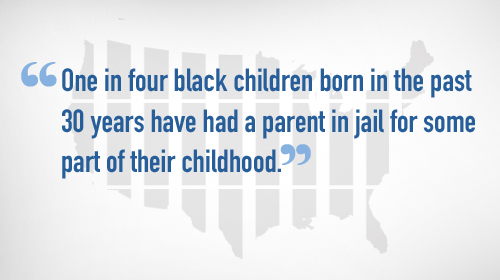For Kids With Parents Behind Bars, The Work of Black History Month Is Incomplete


Over the last month, people across the country have retold the stories of heroes like Dr. Martin Luther King and Rosa Parks. We've remembered the legacy of those who fought for rights and justice in this country and reflected on the injustices of our nation's history. But today, on the last day on Black History Month, I believe it is a fitting tribute to all those who fought the battles of the past to look forward to the injustices we have not yet overcome.
One of greatest injustices still alive and growing in America was put into new light by John Tierney of the New York Times in a recent article. Writing about the mass incarceration epidemic, Tierney cited a study that found that one in four black children born in the past 30 years have had a parent in jail for some part of their childhood.
What often goes overlooked in the fiscal, legal and moral discussion on prisons is the impact that imprisoning so many fathers and mothers can have on their children, spouses and communities. Children and spouses—typically mothers since more than 90% of prisoners are male—are left financially vulnerable from the absence of one parent's income. Between household expenses and the cost of visiting the imprisoned parent, families often struggle to get by.
Even once they've been released and reunited with their families, former prisoners still struggle to contribute financially. Research finds that, accounting for other factors, incarceration typically reduces one's annual income by 40% after release.
Fewer financial resources often mean less access and opportunity for families across the board, including to quality education and healthcare. Financial instability can also expose the family to more extreme measures like homelessness and even further criminal activity. The disproportionate incarceration rate of blacks is one of the major reasons for the continued income inequality between races.
Piling on the financial stress, kids with incarcerated parents are shown to suffer academically, socially and emotionally. Studies show that boys with incarcerated fathers demonstrate less interest in school and a greater propensity for violent acts. The heart-wrenching experience of having a loved one locked up also means that spouses are more likely to suffer from depression and are prone to riskier behavior.
The multi-generational impact of mass incarceration, as a result of the severe draining of human and financial resources from the African American community, cannot be overstated and should not be overlooked. Dr. Donald Braman of George Washington University says, "The social deprivation and draining of capital from these communities may well be the greatest contribution our state makes to income inequality."
Income inequality and the constant disruption of familial life inevitably leads to a lack of opportunity and stability, creating a cycle of imprisonment and poverty. An entire generation of African American youth has been born into the mass incarceration era, and another is coming in behind it. The multi-generational implications of this problem make it that much more serious.
As we end Black History Month, it's important not just to celebrate past accomplishments but to fight battles for victories not yet won. As of today, there are more African Americans in prison, parole or probation than were enslaved in 1850, and nearly fifty years after the Voting Rights Act was signed into law, increasingly more blacks are disenfranchised due to laws that ban those with criminal records from voting. Our country has made great strides toward equality, but we there is still much work left to be done.
Learn more about racial justice and other civil liberty issues: Sign up for breaking news alerts, follow us on Twitter, and like us on Facebook.

